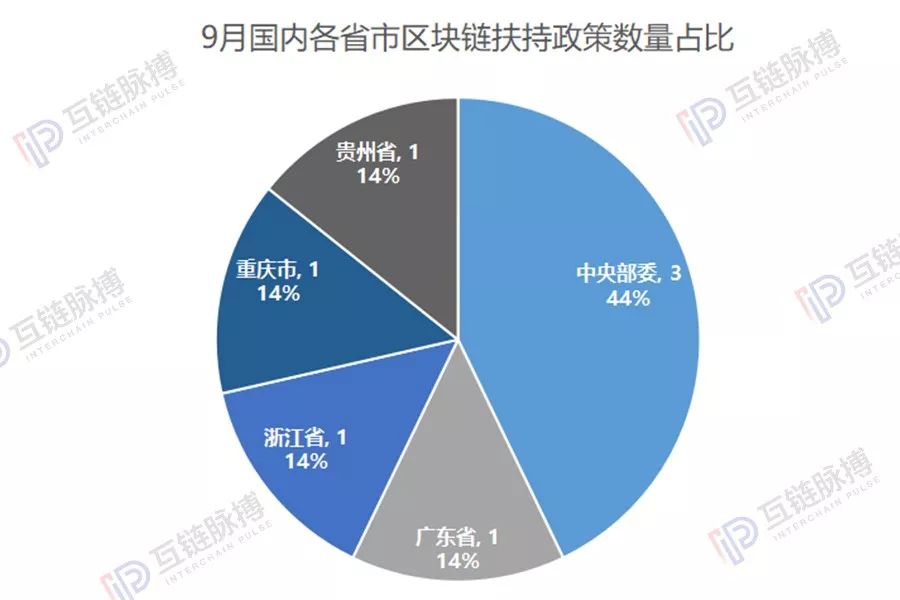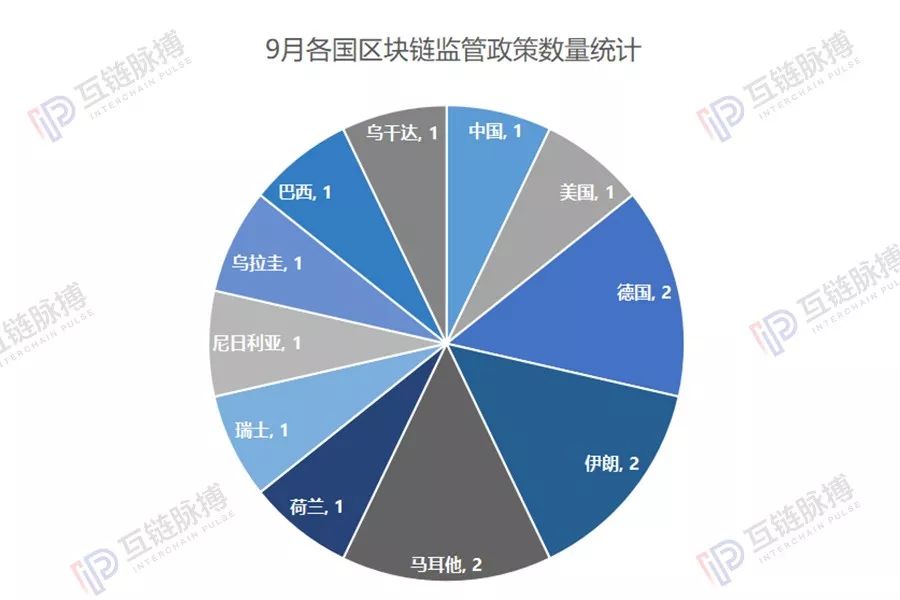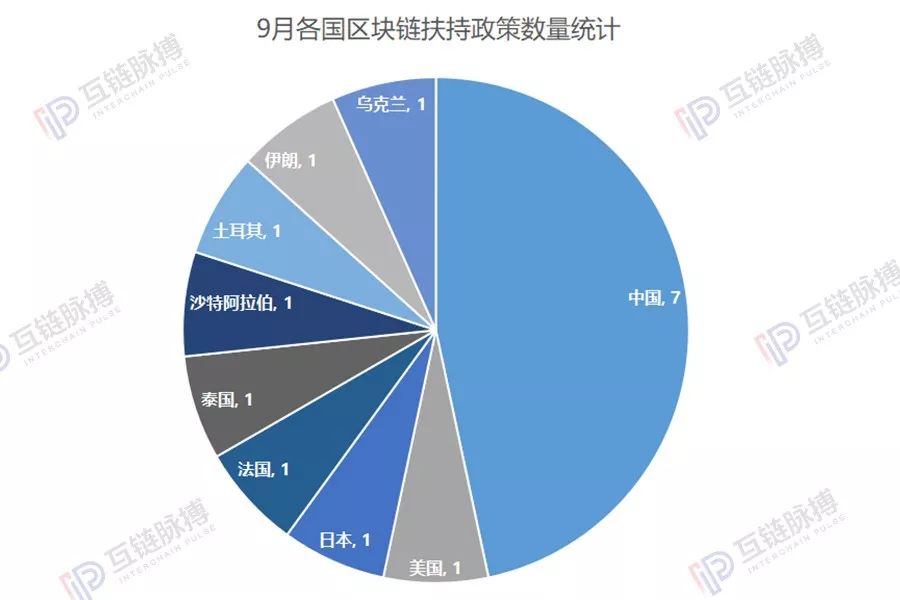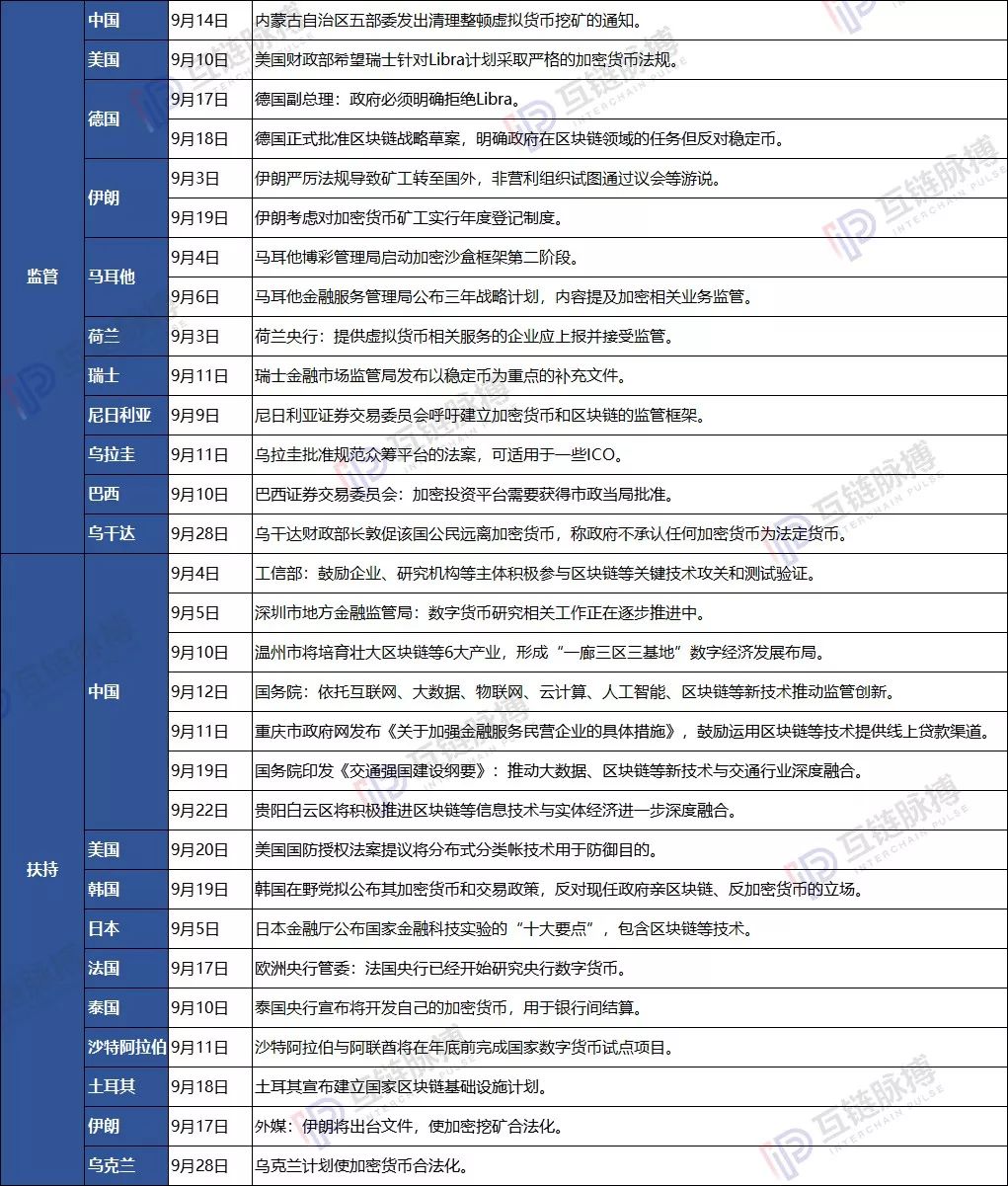Monthly Report | September Domestic and Foreign Blockchain Policy: Virtual Currency Mining Supervision Strengthens Legal Digital Currency Multi-Country Support
Mutual chain pulse statistics related to the blockchain policy of various countries in September. Among them, one of the starting points of German regulatory policy information stems from its doubts and opposition to Libra.
The French central bank began to study the central bank's digital currency, which is also the response to Libra's move. In September, the blockchain policies at home and abroad were still more affected by Libra.
In addition, the inter-chain pulse observed not only France, but also the development of central bank digital currency in September at home and abroad. Work on digital currency research in Shenzhen is gradually progressing; the Bank of Thailand announced that it is developing its own cryptocurrency; Saudi Arabia and the United Arab Emirates will complete the national digital currency pilot project by the end of the year.
In terms of blockchain supervision, domestic Inner Mongolia and foreign Iran have published information related to the supervision of virtual currency “mining” in September.
- Zuckerberg "Second Palace" attends the hearing Libra can break through the blockade
- September public chain observation: How to treat Bitcoin mining after the market?
- How to create an encrypted startup, you need to avoid the minefield
Inner Mongolia does not support the spirit of the virtual currency “mining” industry that is not related to the real economy, and has carried out inspection and clean-up work; while Iran’s supervision tends to seek a balance between legal supervision and avoidance of capital flight.
Under the two-phase effect, the living space of mines at home and abroad seems to be shrinking.
Domestic blockchain policy: Inner Mongolia supervises mining industry Shenzhen promotes digital currency research
Mutual chain pulse According to public information statistics, in September, there was only one information related to the domestic blockchain supervision policy, and the number was the same as that of the previous month; there were 7 information related to the support policy, and the number of information related to the support policy in August 19 In comparison, the chain ratio decreased by 63.15%.
Among them, only one blockchain regulatory policy information in September was related to the “mining” industry in Inner Mongolia.
On September 14th, according to a notice issued by five relevant departments of Inner Mongolia Autonomous Region, entitled “Inspection of the inspection and clearing of virtual currency 'mining' enterprises”, the Inner Mongolia Autonomous Region will focus on cloud computing, big data, Blockchain, IDC and other related companies conduct inspections.
According to the document, the virtual currency “mining” industry belongs to the pseudo-financial innovation that has nothing to do with the real economy. In the spirit of not supporting it, the Autonomous Region Development and Reform Commission, the Public Security Department, the Ministry of Industry and Information Technology, the Financial Office and the Big Data Bureau decided to launch such enterprises in the whole region. Clean up and reorganize the orderly exit related work. The inspection process is from September 3 to October 30, and is divided into two stages: self-examination and self-correction, and supervision and rectification.
China's Inner Mongolia and Sichuan have always been "large mining" provinces. Mutual chain pulse observation, Inner Mongolia Autonomous Region chose to rectify at this time, or because Sichuan will enter the dry season after October, and the mine has a tendency to migrate to Inner Mongolia, Xinjiang and other regions. Therefore, before the virtual currency “mining” was further developed, Inner Mongolia carried out clean-up and rectification work.

(Cartography: Mutual Chain Pulse Institute Data Source: Public Information)
In terms of domestic blockchain support, in September, the central ministries mostly referred to blockchain technology while referring to the simultaneous development of other new technologies.
For example, on September 4, the Ministry of Industry and Information Technology proposed to encourage enterprises and research institutions to actively participate in key technologies such as blockchain research and verification. On the 12th, the State Council pointed out that relying on the Internet, big data, Internet of Things, cloud computing, artificial intelligence, and block New technologies such as chain promoted regulatory innovation; on the 19th, the State Council issued the "Outline for the Construction of a Powerful Country", pointing out that the promotion of new technologies such as big data and blockchain is deeply integrated with the transportation industry.
In addition, Shenzhen, Guangdong Province, Wenzhou City, Zhejiang Province, Guiyang City, Guizhou Province, Chongqing and other governments have also proposed to foster and encourage the development of blockchain.
Wenzhou City and Guiyang City also attribute the development of blockchain to the new technology to promote the development of digital economy and real economy. The Chongqing Municipal Government mentioned the specific application scenarios. On September 11, the Chongqing Municipal Government Network issued the “Specific Measures for Strengthening Financial Services Private Enterprises” to encourage the use of blockchain and other technologies to provide online loan channels.
In addition, on September 5, the Shenzhen Municipal Bureau of Local Financial Supervision said that the work related to digital currency research is gradually being promoted.
Foreign blockchain policy: Germany and France focus on Libra regulation and promote multinational development of CBDCs
According to incomplete statistics of inter-chain pulse, in September, there were 13 information related to foreign blockchain regulatory policies, down 55.17% from 29 in the previous month. Among them, the number of regulatory policy information is relatively higher than that of other countries are Germany, Iran, Malta, and there are 2 related information.

(Cartography: Mutual Chain Pulse Institute Data Source: Public Information)
The relevant information on German regulatory policies is mainly based on the opposition to Libra. On September 17, the German Deputy Prime Minister stated that the government must explicitly reject Libra; on September 18th, the German Federal Cabinet officially approved the draft blockchain strategy announced in June 2019. The draft strategy establishes priorities for the German government in the blockchain sector, such as digital identity, securities and corporate finance. At the same time, it also pointed out that the government will not tolerate a stable currency such as Libra led by Facebook, which poses a threat to the national finance.
The document also added that the German government will cooperate with the Bundesbank to launch a “digital central bank currency”. This strategy also seems to be aimed at Facebook's digital currency Libra.
It is not only Germany but also France that is skeptical about Libra. Although France did not introduce relevant regulatory policies this month, on September 17, the European Central Bank’s governor, Villeluva, said that the French central bank has begun to study the central bank’s digital currency. This move seems to be a response to Libra.
On the other hand, Iran, which also has two blockchain regulatory policy information in September, is mainly targeting virtual currency “mining”. On September 3, it was reported that Iran’s strict regulations led to the transfer of miners abroad, and non-profit organizations tried to lobby through the parliament. Subsequently, according to media reports on September 19, the Iranian cabinet is studying a proposal to register cryptocurrency miners every year. A draft for registration of encrypted mining operations was officially approved in Tehran.
At the same time of supervision, Iran also has information on “mining” related policies for support purposes. On September 17, foreign media reported that Iran will issue documents to legalize encrypted mining. The main points of the document involve: establishing an encryption mining business license system; the commercial institution license can last for 12 months and can be renewed; the encrypted mining power consumption limit is specified (no more than 30 kilowatts, but the power consumption is too low) Issue a license) and so on.
Iran seems to be laying the groundwork for the sustainable development of the country's mining industry and trying to find a balance between legal regulation and avoiding capital flight.
As a well-known blockchain and cryptocurrency-friendly jurisdiction, Malta's regulation of encryption-related services is more for the purpose of improving the blockchain ecology.
On September 4th, the Malta Gaming Authority began the second phase of its sandbox framework, which is designed to allow licensed game operators to use cryptocurrencies. At the same time, the Malta Gaming Authority has confirmed that the sandbox regulatory framework will be extended to December 31, 2021.
On September 6, the Malta Financial Services Authority announced a three-year strategic plan that referred to encryption-related business regulation. The Malta Financial Services Authority said it will actively monitor and manage the business risks associated with the licensing of virtual asset business. Mutual chain pulse observation, the program is mainly aimed at blockchain-related fraud, to prevent money laundering and financing terrorism.

(Cartography: Mutual Chain Pulse Institute Data Source: Public Information)
In terms of support, there were 9 information on blockchain support policies in foreign countries in September, which was a certain increase compared with the previous month. Among them, France, Thailand, Saudi Arabia and the United Arab Emirates are both promoting the research and development of central bank digital currency and national digital currency.
On September 10th, the Bank of Thailand announced that it is developing its own blockchain environment and cryptocurrency for interbank settlement in a faster, more real-time system. On the 11th, the Saudi Arabian Monetary Authority is responsible for banking. The deputy governor said that Saudi Arabia and the United Arab Emirates will complete the pilot work of cross-border banking transaction digital currency before the end of the year; on the 17th, the European Central Bank Management Committee said that the French central bank has begun to study the central bank digital currency.
On the other hand, Turkey is advancing the construction of national blockchain infrastructure, and Ukraine is promoting the legalization of cryptocurrency.
It is reported that the Ministry of Industry and Technology of the Republic of Turkey announced on September 18th the establishment of the “National Blockchain Infrastructure” program to use distributed ledger technology (DLT) in public administration. The strategy emphasizes that the blockchain and DLT are priorities for the national technology plan for the coming year. A new blockchain open source platform initiative will also be established in Turkey to analyze different blockchain use cases, such as land registration, academic certificates and customs, to identify potential public sector applications for the blockchain.
On September 28th, a deputy minister appointed by the Ukrainian Ministry of Digital Transformation confirmed that one of the agency’s primary goals was to legalize cryptocurrencies. In addition, the government plans to transfer public registers and documents to the state-owned distributed ledger system.
Mutual Chain Pulse Statistics of Blockchain Policy in September 2019:

Wen Hao Mutual Chain Pulse · Golden Car
Unauthorized, may not be reproduced!
We will continue to update Blocking; if you have any questions or suggestions, please contact us!
Was this article helpful?
93 out of 132 found this helpful
Related articles
- Investment management company VanEck: Bitcoin is a great tool for diversifying your portfolio
- CFTC Chairman: ETH is not a security, it is a commodity; the forked asset should be classified into the same category as the original asset.
- The United Nations has set up a cryptocurrency fund to accept bitcoin and Ethereum donations.
- Facebook is putting pressure on the currency, and central banks are issuing digital currencies.
- Is the Ethereum TPS 2000 enough? The capacity expansion is not as good as the Optimistic Rollup of Plasma.
- After a lapse of five years, the United States updated the cryptocurrency tax rules, still did not figure out the airdrops and forks?
- Jia Nan Zhi Zhi went to Nasdaq, and the mining giant's listing road ushered in the final






